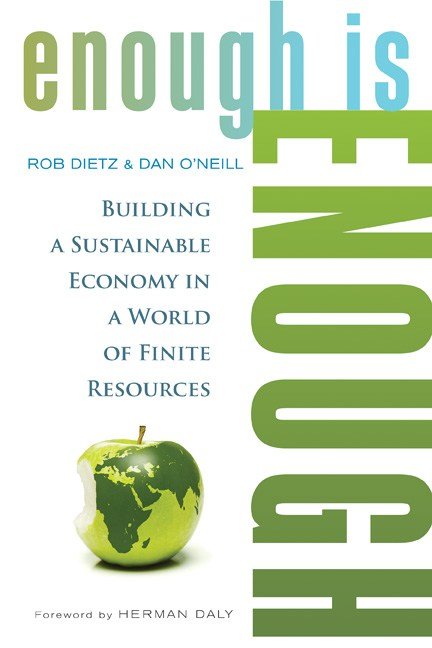Enough: The Central Concept in Economics
by Herman Daly
Foreword to Enough Is Enough: Building a Sustainable Economy in a World of Finite Resources by Rob Dietz and Dan O’Neill (published by Berrett-Koehler in the U.S. and Earthscan in the U.K.)
I have long wanted to write a book on the subject of “enough” but never did. Now I don’t have to because Rob Dietz and Dan O’Neill have done it in a clearer and more accessible way than I could have. Therefore, it is a special pleasure for me to write a foreword calling attention to their important contribution.
Enough should be the central concept in economics. Enough means “sufficient for a good life.” This raises the perennial philosophical question: What is a good life? That is not easy to answer, but at a minimum, we can say that the current answer to “having ever more” is wrong. It is worth working hard and sacrificing some things to have enough, but it is stupid to work even harder to have more than enough. And to get more than enough not by hard work but by the exploitation of others is immoral.
Living on enough is closely related to sharing, a virtue which today is often referred to as “class warfare.” Real class warfare, however, will not result from sharing, but from the greed of elites who promote growth because they capture nearly all of the benefits from it while “sharing” only the costs.
Enough is the theme of the story of God’s gift of manna to the ancient Hebrews in the wilderness. Food in the form of manna arrived like dew on the grass every morning and was enough for the day. If people tried to gather more than enough and accumulate it, it would spoil and go to waste. So God’s gift was wrapped up in the condition of enough—sufficiency and sharing—an idea later amplified in the Lord’s Prayer, “give us this day our daily bread.” Not bread for the rest of our lives or excess bread with which to buy whatever luxuries we may covet, but enough bread to sustain and enjoy fully the gift of life itself.
This story from Exodus has parallels in the thoughts of pioneer ecological economist and Nobel Prize-winning chemist, Frederick Soddy. Soddy observed that humanity lives off the revenue of current sunshine that is gathered each day by plants with the aid of soil and water. Unlike manna, some of the sunshine was accumulated and stored by geologic processes, and we have consumed it lavishly with mixed results. Today, we also try to accumulate surplus solar income and exchange it for a permanent lien on future solar income. We then expect this surplus, converted into debt in the bank, to grow at compound interest. But the future solar-based revenue, against which the debt is a lien, cannot keep up with the mathematics of exponential growth, giving rise to debt repudiation and depression.
For the Hebrews in the wilderness, the manna economy was designed with “enough” as a built-in feature. Our economy does not have that automatic regulation. We have to recognize the value of enough and build it into our economic institutions and culture. Thanks to Dietz and O’Neill for helping us do that.
 Herman Daly is CASSE Chief Economist, Professor Emeritus (University of Maryland), and past World Bank senior economist.
Herman Daly is CASSE Chief Economist, Professor Emeritus (University of Maryland), and past World Bank senior economist.


thank you for reminding me of the relationship we are to have to manna
Thanks for the notice. I just downloaded a Kindle version.
Following here, I offer a few “local planet” thoughts based on my studies and experience as a regional planner, one devoted to improving the quality of life in my region, Virginia’s Northern Shenandoah Valley, a regional community of communities:
Life is an unfunded mandate. Newborns arrive and the community must provide.
“Community motive” recognizes this necessity and cooperates to achieve it.
Life operates in a risk filled natural environment, so communities build wisdom over time to support their perpetuation. Security is the primary purpose of community.
Humanity managed to perpetuate itself in many communities and at some point in its social evolution, the “profit motive” emerged. It is a lesser motive, yet we have been taught that all good things come because of this one motive.
While this notion has been powerful in terms of behavior, its pursuit has led to unpayble debts and unrestorable consumption of resources; a depletion of our future options. The belief that the “profit motive” can correct the problems might be tempered by the articulation of a greater “community motive.”
Enough already.
Perhaps this book will help with the needed understanding and work toward “miracles of the commons,” communities recognizing how the many commons are damaged, what tragedies have occurred, and how our notions of growth and profit need to be reset to mitigate and thus limit future tragedies.
How I got to the term “community motive,” used once in print by Aldo Leopold in 1944, is explained here: http://regional-communities.blogspot.com/2012/11/given-many-problems-we-face-only.html
We have wrestled with this concept of “enough” living off grid and producing all our own energy and much of our food. When you produce these things yourself you become aware of how hard it really is, and how everything is finite, which makes the concept of “enough” all the easier to define. We try and give our personal account of our journey to “enough” in “Little House Off The Grid, Our Family’s Journey to Self-Sufficiency” http://www.cammather.com/